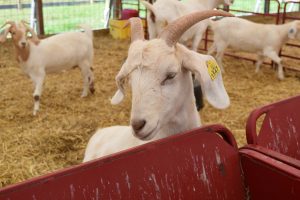Located on the south end of campus, Peckham Farm offers students in the animal science program the ability to get hands-on experience with a number of farm animals.
Fred Launer, a lecturer for both AVS 102 and 104 on the farm, explained how the farm is three-fold. “It’s a teaching facility, a research facility and it’s outreach to the community” Launer said. “There’s always interesting things going on in the farm.”
For AVS students at the University of Rhode Island, the farm is a way to learn the information that was first introduced in the classroom.

Students are able to learn from the farm’s living animals, rather than relying solely on the textbook material they are tested on.
“We have a lot of students that are accepted to vet school,” Launer said. “So we must be doing something right because that’s very difficult to do.”
Some of the requirements to get into veterinary school include working with larger animals, which many students are able to do through working as teaching assistants (TAs) during the labs. As a TA, the students help with labs and show other students how to work properly with animals, as well as how to perform medical tasks such as taking blood and vaccinations.
“I love going to the farm and teaching students and making them love [animal science] as much as I do,” Jessica Solomon, a senior AVS Student on the veterinary track at URI, said.
There are three different tracks in AVS: Animal Management, Animal Science and Pre-Veterinary. Besides AVS 101, all AVS classes are only offered to students in AVS programs.
“There’s such a demand for [the courses] and we’re bursting at the seams so it’s really limited to only AVS students,” Launer said.
Nick Miniter is both the farm manager and the only full-time staff member on the farm. He said that the farm is currently maxed out in capacity with the animals they have.
Launer added that “from an animal welfare stance we clearly meet the regulations, but we don’t want to have the animals until we have a place to keep them.” Launer also said there are plans on the table right now to look into expanding and improving the farm’s facilities in order to house more animals.
“My main responsibility is making sure the animals are taken care of and healthy,” Miniter said. “We take that part seriously. Secondary to that is making sure the farm is taken care of.”
This year, Miniter has hired four work-study students to help him on the farm. These students not only help him feed the animals, but they also make sure everything on the farm is running smoothly.
“It’s run very well,” Becky Provensal, one of the work-study student workers on the farm, said. “All the animals are happy, so that makes me happy.”
Though most of the farm is research and education based, it does incorporate outreach with the community.
“The farm isn’t really designed to be a… for lack of a better word, petting zoo,” Miniter said to caution students.
While Peckham Farm is open to the public from 9 a.m. to 3 p.m., the farm also offers some outreach programs, most of which occur during the summer when classes aren’t in session.
“We have a lot of younger students come,” Launer said. “[We] show them the proper methods we’re doing here.”
Launer said a lot of the public visit the farm to see where their tax money is going to. “It gives them a better appreciation of what’s going on,” he said.





